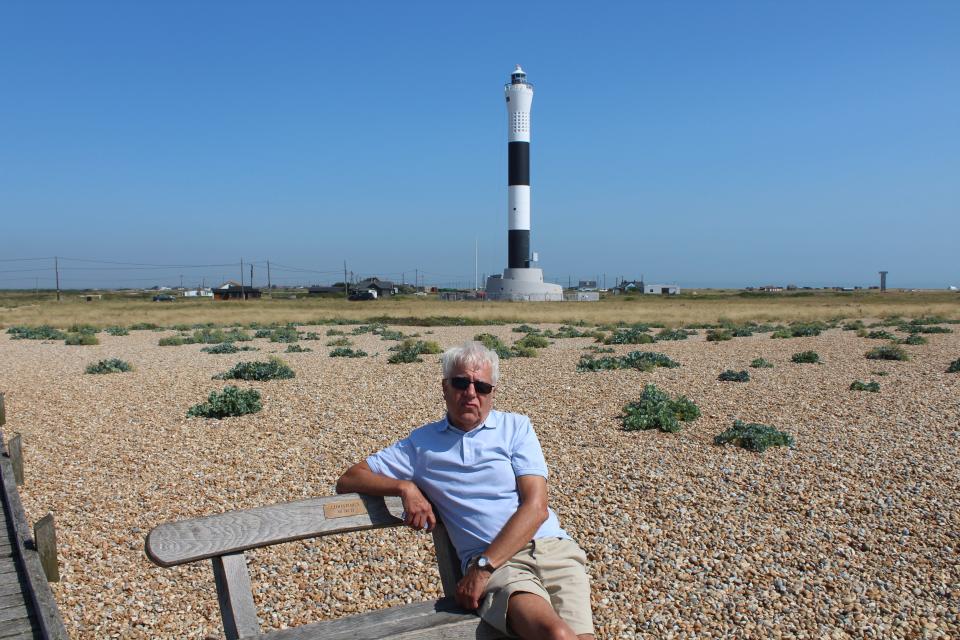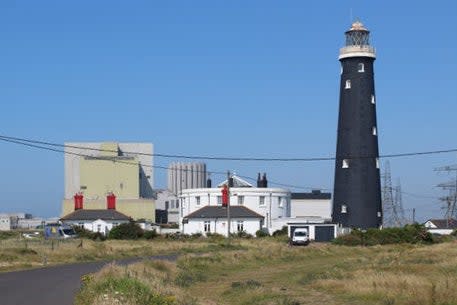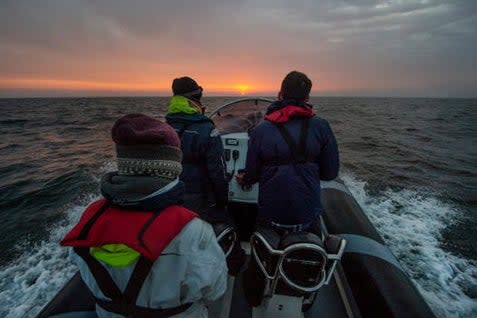‘We were built on immigration’: Kent coast reacts after record-breaking week for asylum arrivals in UK
On the Kent coast, the subject of immigration remains divisive. It is at the forefront of everyone’s minds after 430 asylum seekers reached the county by dinghy from France on Monday, more than on any other previous day.
The largest of these landings took place in the sparsely populated town of Dungeness, with around 50 people arriving on its shingle beach aboard one vessel.
Monday’s new arrivals mean that 8,452 migrants have reached the UK’s shores this year, already exceeding 2020’s total of 8,410.
The Home Office responded by saying it is tackling the “unacceptable problem”, while Nigel Farage reported for GB News from the Channel, commenting that were the weather to turn for the worse, “that would be the end of that lot”, gesturing to a group of asylum seekers.
In Dungeness, one resident, who did not want to be named, says such reactions “make me really depressed. I am utterly horrified that people have such little empathy for others, that they don’t question why migrants make such a horrendous journey.”
She believes England has become very selfish, pointing to the government’s policy of housing asylum seekers at Napier army barracks, in “squalid” conditions. “It’s a hideous representation of what this country has become in my opinion,” she says.
Just down the road, one of her neighbours, who also spoke on condition of anonymity, agrees with her. Upset by a local’s tweet that they were locking their doors in light of the landings, she tells me she keeps hers unlocked. “We don’t live in fear,” she says, describing the boat journeys as “just incredibly sad to see”.
A short walk away, John Briggs, who worked as an airport immigration officer for 46 years, is sitting on the beach by the new lighthouse, a few hundred metres from where the boat reached the shoreline on Monday. A Londoner, he is down at the sea visiting a friend.

He reserves the most anger for traffickers potentially involved in the migrant trail, and thinks people arriving in the UK have been sold a lie.
“I find it disturbing really – because I don’t think people know what they’re coming for. They’ve paid a fortune [to traffickers] because they’ve been told the streets are paved with gold,” he says.
Although his main concern is with human traffickers, whom he describes as the “evil ones”, Mr Briggs questions whether any of this week’s arrivals are “genuine refugees”, a phrase later repeated by others.
Mr Briggs accuses France of “passing on the problem”, claiming it “escorts” the migrants towards British waters. He also takes aim at human rights lawyers, suggesting they are motivated by profit into supporting refugees through the British courts.
Further up the beach, groups of men stand fishing leisurely at the water’s edge. Two ex-soldiers – one from Dungeness, the other from Maidstone – are forthright in expressing themselves.

“It’s getting mad now,” one says in reference to the number of asylum seekers arriving by boat. “The country just cannot afford to keep this going,” he claims.
Over on the other side of Dungeness, Niko Miaoulis, owner of The Pilot pub, has actually met some of the refugees who have travelled by dinghy from the French coast, speaking to them as they waited for border force officials to arrive.
He dispels myths about them, including the notion that they are all young men. Women and children also come ashore, he says. “All of them are very well-behaved. They sit and wait. They want to claim asylum, they’re not rampaging across our countryside, like people would have us believe. I think a lot of them go on to contribute to our society.”
Mr Miaoulis notes that asylum seeker applications are lower this year than they were last year. He believes the main reason the issue is in the spotlight is because of the visibility of the migrants’ favoured route. “The reason it’s got so much exposure is the landing of boats on beaches. In the past, they would have come on lorries and slipped away into our society and not been noticed.”

Kim Bryan is of the same opinion. Worried that the sea route across the world’s busiest shipping lane was becoming increasingly popular and therefore dangerous, she and a group of like-minded people set up Channel Rescue last August. The rights organisation monitors the coastline and looks out for the safety of refugees by alerting the coastguard about the presence of refugee boats. They also guard against the far right, who have been known to abuse migrants – verbally and sometimes physically – upon their arrival.
This week, Channel Rescue volunteers spotted one group’s boat heading towards some rocks. After pointing them away from the danger, they went down to the beach to give them support. A photograph of their action was taken and shared both online and in the press, leading to a torrent of abuse against the organisation.

The way of thinking about migrants in this country should change, Ms Bryan suggests. “The UK takes a lot lower percentage of asylum seekers and refugees than our European counterparts. We’re not being invaded, we’re not being stormed.”
To her, the language used by certain prominent politicians and public figures is deeply problematic, and plays into the hands of the far right. “I think what [Nigel] Farage and [Priti] Patel are doing is making it more and more dangerous for people. This whipping up the ante isn’t doing anyone any favours.”
One target of Mr Farage’s scorn in the past few weeks has been the Royal National Lifeboat Institution (RNLI), which he accused of acting as a “taxi service for illegal immigration”. The RNLI defended itself in a tweet on 5 July, saying it only “exists to save lives at sea...without judgement of how they came to be in the water”.

Mr Miaoulis praises the RNLI volunteers, who work just a stone’s throw away from his pub. “The lifeboat people are brilliant. They can be subject to a lot of negative comments about them going out and ‘rescuing’ some of these people,” he says, adding they are simply doing their job by ensuring that no one drowns.
A subject Mr Miaoulis returns to is how Britain has benefited from centuries of immigration, as has Dungeness. “This community was built on immigration. Dungeness stemmed from the Huguenots, who were kicked out of France 250 years ago,” he observes.
Read More
Joey Barton pleads not guilty to assaulting wife
Passengers rescued from submerged bus by volunteers in rubber dinghy during flash floods
Scottish veteran climber dies in avalanche on K2 mountain while ‘doing what he loved most’

 Yahoo News
Yahoo News 
